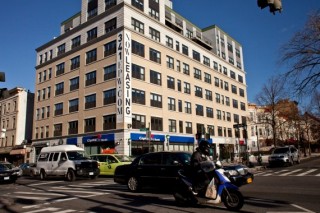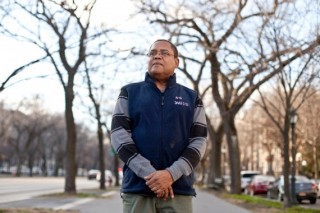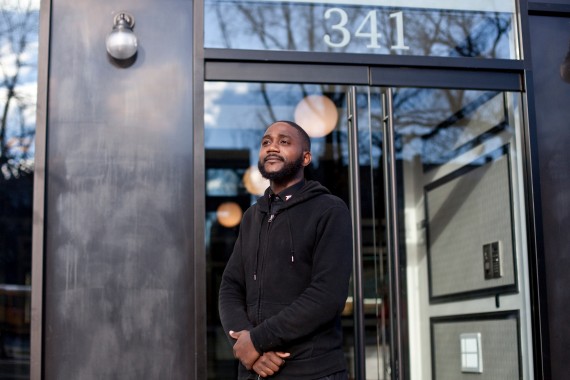When Isaac Bowman got a concierge job at a Queens apartment building last year, he hoped it would be his ticket out of a homeless shelter and into New York City’s middle class.
The pay was low at only $10 an hour. But at least it was a start toward getting his partner and three stepchildren into an apartment of their own, Bowman reasoned.
Bowman took the job — and became a victim of wage theft.
Under terms of a large city tax subsidy, owners of the 117-unit building, The Exo, were legally bound to pay Bowman $16.88 an hour — almost 70 percent more than he got — plus benefits now worth $10.13 per hour.
The higher pay is required at bigger buildings that benefit from the city’s 421a housing program, which grants about $1.1 billion in tax breaks each year to owners. In return, they must pay service employees the “prevailing wage” — a rate set by the city comptroller that is benchmarked to union contracts so that non-union workers get comparable pay for similar work.
Paying less than the law requires can subject employers to losing their tax break. But city officials haven’t enforced the rules on compensation at 421a buildings, leaving workers like Bowman vulnerable to abuse.
“They’re stealing from people like me,” said Bowman, who only learned of the requirement from union organizers this year. “I don’t think it’s fair.”
Forest Properties, which owns the Exo, did not respond to requests for comment. Neither did the building manger. Tax bills show the Exo has been receiving an annual 421a property tax break worth about $900,000 since 2011.
The failure to police the prevailing wage mandate is one more in a series of oversight lapses by city and state officials who regulate the 421a program, which is New York City’s biggest housing subsidy.
As ProPublica has reported, thousands of building owners have failed to register their apartments for rent limits, as required by law. Landlords also have banked the 421a tax breaks unabated while overcharging tenants with bogus “preferential” rents and abusing other rules meant to protect tenants.
When it comes to prevailing wages, there’s little debate that enforcement has been lacking. The city agency that administers 421a — the Department of Housing Preservation and Development (HPD) — says that it has no authority pursue employers and readily concedes that it hasn’t done so.
Oversight of the wage requirement was transferred to city comptroller’s office under a reauthorization of the 421a program that lawmakers approved last summer in Albany.
Comptroller Scott Stringer told ProPublica he will use the “full weight and resources” of his office to hold building owners accountable, but how far his reach will extend remains to be seen.
That’s because lawmakers, as part of the reauthorization, required the city’s real estate lobby and building trades unions to agree on an expansion of prevailing wages to construction jobs on new 421a buildings. Without a deal by Jan. 15, the city will lose authority to approve new 421a projects.
The two sides aren’t discussing details of the talks. But Gary LaBarbera, the lead union negotiator, said regulators need to act because wage theft is already “an epidemic problem” for nonunion construction workers.
As is, it’s up to workers to bring wage-theft allegations to the attention of authorities. But employees are caught in a Catch–22: They often have no idea that they’re entitled to the prevailing wage, and finding out if they are isn’t easy.
Smaller 421a buildings are exempt from the requirement, and while HPD keeps a list of the buildings that are covered, the agency doesn’t disclose it. HPD turned down ProPublica’s requests to release the list, and officials in Stringer’s office also declined to provide it, saying the list is not yet finalized.
To fill the gap, 32BJ Service Employees International Union has launched a push to identify buildings that are covered and to educate workers about their rights. The Real Estate Board of New York, which represents large developers and building owners, said it is working with the union “to put in place clear procedures to ensure the effective enforcement” of prevailing wages for service workers.
“We have to be like your neighborhood police,” said 32BJ President Hector Figueroa, because prevailing wage laws “have very little meaning if they’re not enforced.”
For most of the 44 years the 421a tax break has been around, there were no wage requirements. That changed in 2007, when lawmakers also expanded the areas in the city where developers getting the tax break had to include reduced-rent apartments for lower-income tenants.
Sponsors of the change estimated that up to half of large 421a buildings did not pay prevailing wages and benefits. By comparison, about 4 in 5 building workers citywide earned those amounts.
The 2007 law explicitly stated that “no benefits” would be granted to 421a buildings that didn’t offer prevailing wages, whether workers were employed directly or by outside contractors. The requirement was limited to buildings with 50 or more units that started construction after December 2007.
The measure was a big win for labor unions like 32BJ, but it contained one big flaw: enforcement.

A view of the 341 Eastern Parkway luxury apartments building in Crown Heights, Brooklyn, N.Y. (credit: Bryan Anselm for ProPublica)
HPD, which determines eligibility for the 421a tax break, was given authority to sanction building owners who didn’t comply. But according to HPD, that didn’t include the power to investigate building owners or to act on complaints. Typically, those duties have fallen to the comptroller’s office.
It is unclear if the missing enforcement authority was an oversight or an intentional omission. “The original statute as it was drafted had a lot of holes in it,” said James Murphy, a labor lawyer at the firm of Virginia & Ambinder in New York.
Regardless, HPD continued to approve 421a tax breaks with little attention to the prevailing wage provision. Since the 2007 law came into effect, up to 400 buildings have come under the 421a wage requirement, according to a preliminary estimate by the city.
The number of workers affected is uncertain, although in 2013, the 32BJ union found that nearly half the 421a buildings it surveyed had underpaid employees.
“New York taxpayers are subsidizing low quality jobs with little or no benefits, which further widens the income gap in the city,” the union said then. It organized protests to bring attention to the issue and criticized HPD for “refusing” to enforce the law, but the agency maintained it had no authority to do so.
This year, as the 421a program again came up for renewal in Albany, New York City Mayor Bill de Blasio said he would support extending the prevailing wage for service workers to cover buildings with just 30 units or more rather than 50.
“Folks who are making $10 to $12 an hour as porters, as security guards, et cetera, will now be making good wages,” de Blasio’s deputy, Alicia Glen, told lawmakers during a June 1 hearing on 421a.
As Glen spoke, one person waited his turn to testify but didn’t get a chance: Isaac Bowman had to leave to report for his concierge job at The Exo, where his pay had been increased to $10.50 an hour.
Bowman was living with his partner in a Bronx homeless shelter for three months when he applied for the position in June 2014. The Astoria building features a fitness center and landscaped rooftop deck overlooking Manhattan and advertises “a 24-hour concierge service to fit your hectic schedule.”
Bowman said he was told that meant opening doors, greeting tenants, helping with luggage and packages and doing light cleaning. Instead, it’s evolved into mopping floors, vacuuming elevators, and cleaning bathrooms, among other duties, all for the same pay.
He said he was asked to join a union — the Special and Superior Officers Benevolent Association — as a condition of keeping the job. The association’s contract shows he is entitled to $2,500 in life insurance, but little else in benefits. The Long Island labor group did not respond to questions.
Murphy, the labor lawyer, said such arrangements are one way employers try to skirt the prevailing wage law. Some employers “mistakenly believe that they can get around their legal obligations by paying benefits to unions with rates below those required by the comptroller,” he said.
Bowman lives in East New York, a far-away corner of Brooklyn where rents are relatively affordable, though not affordable enough at his pay. Bowman relies on a federal Section 8 housing subsidy to cover three-fourths of his family’s $1,880 monthly rent. They also receive $220 a month in food stamps.
“We basically just get by,” he said.
Bowman’s direct employer, Defender Security Services, which staffs The Exo under a contract with the owners, declined to answer questions about employee wages.
While some employers flat-out ignore prevailing wage rules, others use work-arounds to pay less.
Domenick Penteck is a doorman at 220 N. 10th Street in Brooklyn, a 64-unit red-brick building that was advertised in one $6,700-per-month apartment listing as “the pinnacle of Williamsburg luxury” with “a 24 hour doorman.” The building is owned by the Rabsky Group, one of Brooklyn’s biggest developers, and gets a 421a tax break worth about $317,000 a year.
Penteck’s pay stub shows he earns the prevailing wage for a doorman, $16.88 per hour, during the day. When he clocks in for his night shift, however, his rate drops to $13.35 per hour, the prevailing wage for an unarmed guard.
“It’s just unfair,” said Penteck, who lives in a public housing project.
The leasing manager for 220 N. 10th said that as far as she was aware, workers were paid prevailing wages and referred questions to Platinum Amenity Services, which staffs the building.
Joel Berkovic, one of the company’s co-owners, said he was “extremely” aware of the 421a program’s prevailing wage provisions. He said it was OK to pay doormen the security guard wage at night because they’re not allowed to pick up packages then. “They are paid prevailing wages,” Berkovic said.
Officials with the 32BJ union, which the building’s workers are trying to join, said Penteck should be paid a doorman’s prevailing rate even at night. Stringer’s office declined to comment.
To make ends meet, Penteck works a second job on weekdays as a prep cook. He wishes that regulators would pay more attention to prevailing wage laws. “They don’t care about a guy like me busting his ass, going to work and leaving one job and going to another job and not sleeping,” he said.
Like other workers interviewed by ProPublica, Penteck learned about the prevailing wage requirements through 32BJ. Workers have been turning to the union for help in the absence of regulators, hoping they can get higher pay.
“This is the way to go about it,” says Jereme Herring, a doorman at 341 Eastern Parkway, a building in Brooklyn’s Crown Heights. Workers there voted 5–0 in November to join 32BJ.
When he was hired last year, Herring was offered $12 an hour with no benefits. He and his co-workers were thinking about unionizing when he found out from 32BJ organizers that the 63-unit building was covered by the prevailing wage law, thanks to its annual 421a tax break of $451,000.

Superintendent Francis R Alphonse poses for a portrait in front of the 341 Eastern Parkway luxury apartments in Crown Heights, Brooklyn, N.Y. (credit: Bryan Anselm for ProPublica)
“It was very unsettling,” said Herring, who has trouble keeping up with rent while taking care of his grandmother. A weekend job helps him get by, he said.
Herring told co-workers, who were equally surprised. When they decided to unionize, they reached out to tenants for support and were gratified by the response.
“We were horrified to learn that they only made $12 bucks an hour with no benefits,” said Matthew Marolla, a management consultant who informally leads a small tenants’ group. He fired off an email in support of the workers, saying it’s only “proper and decent” for them to have health insurance.
32BJ officials said they will soon sit down with the building’s representatives to negotiate a contract. Red Group Management, which runs the building for the owners, did not respond to a request for comment.
For Francis Alphonse, the building superintendent, the 421a wage requirement means his pay should be $24.83 per hour, plus benefits worth $10.38. He’s been earning about $15.63 per hour with no benefits, based on his pay stub and hours worked.
“When you know the government is giving out these big tax breaks and they do nothing for the workers,” Alphonse said, “it’s like you want to cry.”
